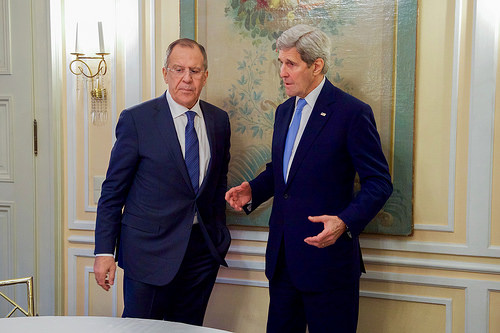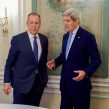
Munich Security Conference Debates Russia’s War in Ukraine (Part Two)
Publication: Eurasia Daily Monitor Volume: 13 Issue: 32
By:

*To read Part One, please click here.
During the Munich Security Conference, the Barack Obama administration’s messages about Ukraine were inevitably affected by being paired with entreaties for Russian cooperation in Syria (see Part One in EDM, February 16). After Secretary of State John Kerry had spoken in that spirit in Munich (Ukrinform, February 13), President Obama called Russian President Vladimir Putin, on February 14, from Washington, asking Putin to play a constructive role in Syria and stop bombing US-backed local forces there. For his part, Putin asked that Ukraine “without further delay […] fulfill its political obligations” toward the Donetsk-Luhansk authorities under the Minsk armistice (Kremlin.ru, Whitehouse.gov, February 14).
Obama and Kerry each urged Russia and its protégés to fulfill their own military commitments under the Minsk armistice. But they yielded to Russia’s demand for “elections” to be staged in the Russian-occupied territory. Obama called for “quickly reaching agreement” on holding elections there, and Kerry asked Russia to “support free and fair elections” there. Since Moscow and Donetsk-Luhansk are trying to rush Kyiv into authorizing such “elections,” Obama’s and Kerry’s remarks will be read as undercutting Kyiv’s position.
On the economic sanctions against Russia, Kerry adopted unusually firm language: the US and its European allies shall maintain the sanctions “for as long as necessary” until the Minsk armistice is fully implemented. “Russia has a simple choice: either it complies with the armistice or it will continue to experience the consequences of economic sanctions. The way to ease the sanctions is by withdrawing weaponry and troops from the Donbas” (Ukrinform, February 13). Obama, however, did not mention the economic sanctions in his call to Putin, as officially reported.
Kerry’s remarks in Munich showed less optimism than he had evinced a few weeks earlier at the World Economic Forum in Davos. There, Kerry had deemed that “with bona fide, legitimate intent to solve the problem on both sides [sic], it is possible in these next months to find those Minsk agreements implemented and to get to a place where sanctions can be appropriately, because of the full implementation, removed” (State.gov, January 21). And in Washington, the State Department’s Sanctions Policy Coordinator, Daniel Fried, had announced, “We see Russia becoming more inclined to a diplomatic solution, hopefully we get there in the course of this year”—in which case the major sanctions on Russia would be lifted, though not the minor ones related to the annexation of Crimea (RFE/RL, January 16).
Both of those statements seemed to communicate the Obama administration’s hope to achieve some kind of compromise with Russia about Ukraine before the expiry of the administration’s term of office. The time-frame suggested by both officials reflected that hope. Any compromise would be confined to Donetsk-Luhansk, excluding Crimea from the diplomatic agenda. Western sanctions on Russia for annexing Crimea outright—and turning it into a power-projection platform threatening North Atlantic Treaty Organization (NATO) members around the Black Sea—are almost trivial. According to Russian Prime Minister Dmitry Medvedev, speaking to the press during the Munich conference, “there is no such issue as Crimea, it does not exist for Russia, it is closed forever” (Euronews, February 14).
An informal meeting of the Normandy Four countries was also held during the Munich Conference. Breaching the etiquette, Russia’s Foreign Minister Sergei Lavrov went public straight from that meeting to present Ukraine with a new demand: Russia seeks Ukrainian recognition of the armed forces of the Donetsk and Luhansk “people’s republics” (DPR, LPR). Recognition should take the form of Ukraine accepting representatives of DPR-LPR forces in their own right into the “Joint Center for Control and Coordination” (JCCC). This body, assigned to monitor compliance with the ceasefire, is comprised of Russian and Ukrainian military officers and operates by agreement between the respective defense ministries. Ukraine refuses to legitimize the DPR-LPR and their militaries.
According to Lavrov, “this situation is absolutely unacceptable. Kyiv does not recognize the Donetsk and Luhansk republics as partners.” While in Munich, Lavrov asked the German, French, and US diplomats there to tell Ukraine “that this has to come to an end” (Interfax, February 15). This demarche confirms Russia’s intention to continue fielding the DPR- and LPR-flagged militaries in this territory as an accompaniment to any political settlement.




